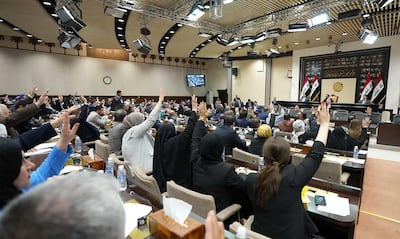Iraq’s passing of the biggest budget in its history has raised concern among experts, who say it will stretch the country's finances to the breaking point.
Government supporters argue that the bill is essential to minimise political wrangling after post-election political rows led to entire years without budgets, most recently in 2022.
Previously, Iraq went without a budget in 2014 and 2020, also due to bitter political divisions.
Despite going 18 months without a budget amid record revenue from oil and legislation that limits government spending to a level below the previous budget, Iraq's Parliament still took four consecutive sessions to pass this year's budget.
Some of the delays were caused by differences between the various political blocs mostly over the semi-autonomous Kurdistan region’s share of the budget, the rights of specific governorates within the region and how its oil will be marketed.

The budget of $152 billion, of which 12.6 per cent is allocated to the Kurdish region, has sparked concerns over how, if oil prices drop below $70 per barrel – a three-year average price the budget expects – then the country will not be able to live up to what is set out in the agreement.
The International Monetary Fund has an even worse prognosis for Iraq's “fiscal breakeven” point – the amount an oil-dependent country needs to balance its budget – saying Iraq may need a price as high as $96 per barrel. Brent crude was trading at about $72 per barrel on Monday.
The budget is based on mostly operational expenses and there is no sizeable investment budget, said Sajad Jiyad, an analyst and fellow at the Century Foundation.
“There is no real investment spending in the budget as it just focuses on expanding what was in previous budgets and leaves very little – a few billion – on investment,” Mr Jiyad told The National.
“Even if the government manages to execute 80 per cent of the budget, it will not increase oil revenues, it will not lead to creation of new jobs.”
Iraq has struggled with low-budget execution rates, hampering spending on vital reconstruction even during times of high oil prices.
Instead, the government must increase investment spending and cut down some other spending to roll back a soaring deficit of about $49 billion.
“If this is not done, then if oil prices fall, we won’t have a real way of paying back that deficit unless we cut back that spending,” he said.
Parliament’s first deputy speaker, Mohsen Al Mandalawi, on Monday said that it was vital to “reduce spending and increase non-oil revenues to maximise state revenues” in the agricultural, service and reconstruction sectors.
Budget continuity
“The budget law is essential for the execution of the government programme and the projects included,” Farhad Alaadin, foreign affairs adviser to Prime Minister Mohammed Al Sudani, told The National.
“The budget law this time provides continuity and prevents disruption of government function. The government will be able to start the implementation of the infrastructure projects and turn Iraq into one of the biggest workshops in the region.”
For Mr Al Sudani, the passing of the budget “prioritises the essential needs of Iraqi citizens and families, aiming to meet their expectations for government services, construction and infrastructure projects”.
“It addresses the issue of recurring or failed projects that has persisted in previous years, while also emphasising reduced operational spending, increased non-oil revenues, and support for the private sector,” Mr Al Sudani said.
Increase in Kurdish tension
The budget has tried to address the long-standing issues between Iraq and the Kurdish region, with its oil revenue set to be deposited in an account overseen by the Iraqi Central Bank and the Kurdish Regional Government.
The new bill reaffirms that 12.7 per cent of oil revenue will go to the semi-autonomous Kurdish region – a reduced amount set in 2018, and down from the 17 per cent the region was meant to receive prior to a 2017 contested Kurdish independence referendum.
The failed referendum worsened the bitter row between both sides and led to budget cuts from Baghdad.
The region has rarely received these amounts in full, however, due to repeated disputes with Baghdad over its oil sector.
The row over independent exports worsened this year when oil supplies going through a northern pipeline to the Turkish port of Ceyhan were halted after an international arbitration ruling deemed them unlawful. A court decided that the export of the oil was in breach of a 1973 agreement between Baghdad and Ankara.
Under the budget, 400,000 barrels per day of oil will now be marketed by Baghdad's State Organisation for Marketing of Oil, with revenue going to a central bank account overseen by the central government.
Article 14 was among the most disputed in the bill, as it entails the management of the region’s oil income and a review of oil contracts in the Kurdish region that Baghdad's Supreme Court has ruled unconstitutional.
The Kurdish Democratic Party, based in Erbil, said that changes to Article 14 broke a prior agreement with Baghdad that the revenue would be jointly managed.
The amendment to the draft allows other Kurdish governorates to challenge the region's spending allocations, strengthening the hand of the Kurdish Democratic Party's main rival, the Sulaymaniyah governorate-based Patriotic Union of Kurdistan, which has aligned itself with Iran-backed parties in Baghdad.
The PUK has long claimed the KDP has withheld what PUK politician Harem Kamal Agha recently called “justice in the distribution of financial dues among the governorates”.


